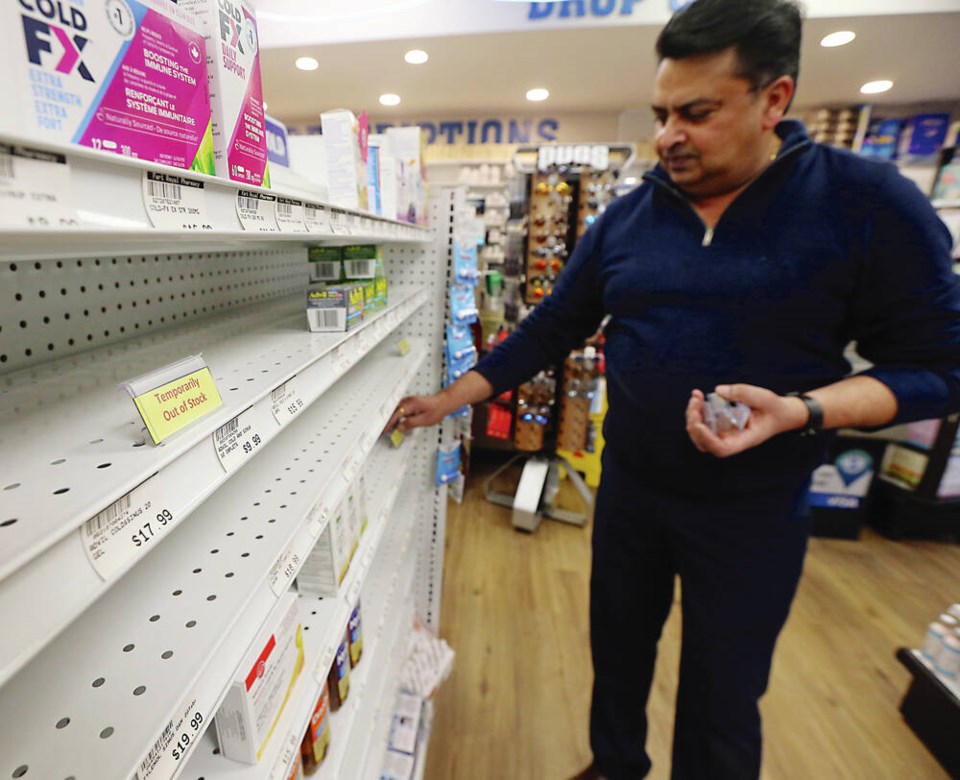Pharmacies across the region are running out of over-the-counter adult medications as cases of influenza, colds, COVID-19 and respiratory illnesses ripple through the population.
Many pharmacies have bare shelves and are fielding multiple calls for medicines like Tylenol and Advil and anything else that can provide relief.
Shortages of children’s medications seen over the past several months are now spilling into adult versions, said Leslie Cotter of People’s Pharmacy in Colwood.
“My whole cough and cold section is looking pretty sad right now,” said Cotter.
She said parents are reducing doses of adult medication for their sick children under advice from health-care professionals, which is adding to the shortages of cold and flu medications overall.
“We’re getting calls every 20 minutes with people asking: ‘Do you have this,’ ” said Cotter. “And it’s everyone, parents, grandparents — even other pharmacies are calling us.”
At Fort Royal Pharmacy on Hillside Avenue, Vik Bawa said his company got a small shipment of children’s Tylenol on Wednesday and immediately sold half the supply. He was expecting it to sell out Thursday.
Bawa’s three locations considered limiting the numbers of products each customer can buy, but ruled out the idea.
“It wasn’t really that fair when you have two or three children and many people in your family [who are sick].”
Health Canada is calling the situation “unprecedented,” after a months-long shortage of children’s pain and fever medication that has sent many parents and caregivers scouring bare shelves and swapping tips on drug sightings.
Observers point to a complex web of factors driving demand, as the global supply chain — still recovering from manufacturing shutdowns — undergoes a slow recovery that is limiting supplies.
An earlier-than-usual surge in influenza and respiratory illnesses, combined with difficulties sourcing active ingredients like acetaminophen and ibuprofen, has made it difficult for manufacturers to keep up.
“It’s a perfect storm,” said Pindy Janda, director of procurement for Imperial Distributors Canada, a Richmond-based pharmaceutical wholesaler that supplies cold and flu medicines in B.C. and Alberta.
Janda said the shortages can be traced to the early days of COVID-19 in 2020, when closures happened, following by reopenings and consumer stockpiling. Now rampant cases of flu and other illnesses are squeezing supplies.
Catching up with the demand has been a challenge for manufacturers, said Janda, who doesn’t think the shortages will be resolved until spring.
And Canada isn’t the only country facing shortages — it’s a global problem, she said.
The products are made in Canada, the U.S., Australia, India and Europe, but the ingredients are sourced in a variety of places, including China.
“You can compare [Tylenol] to a car that’s made in the U.S. Well, the car might be made there, but a lot of the components come from several places,” said Janda.
India is one of the world’s largest drug manufacturers, and China is one of the largest producers of raw ingredients, she said.
“It all has to come together,” Janda said — and when there’s unprecedented demand, that’s hard to do.
She said pharmacies in B.C. are getting supplies of medicines but “it’s only coming in dribs and drabs” as illnesses in children and adults spike.
The federal government promised “fair distributions of supply” across Canada in November when it reached out to manufacturers for more than a million bottles of children’s cold and flu medicines during unprecedented cases of illnesses across the country.
But some pharmacists are saying B.C. is getting much less than Ontario and Quebec.
Janda said some medicine manufacturers that ship to Canada use population as a barometer on how much to send. “So compared to Ontario and Quebec, we don’t get as much,” she said.
Angelique Berg of the Canadian Association for Pharmacy Distribution Management said manufacturers usually build inventory steadily from May through August, in preparation for cold and flu season. But spring and summer stock was depleted much earlier than anticipated.
“What happened was the demand shifted so much earlier and lifted so much more sharply that even trying to catch up is a mad task for producers,” said Berg. “I think everyone in the supply chain was hopeful that [demand] would taper off. It has not tapered off.”
Observers say it can take months for supply-chain issues to be corrected because of difficulties surrounding sourcing of raw materials, factory schedules and the shortages of labour.
Bawa says he doesn’t know what orders will arrive or when. “The supply chain is very unpredictable.”
Cotter said everything cold- and cough-related is disappearing fast from shelves. Products like cough syrups and vaporizing gels are being seen as the only relief for some.
The adult generic versions of Tylenol and Advil are now almost depleted.
She said some are turning to clove oil, which is used for teething babies, and other natural products.
Health Canada warns parents not to use adult fever and pain medications on children under 12 without consulting a health-care professional, citing a “serious risk” of overdosing, especially with acetaminophen, which can damage the liver.
It also recommends using cold compresses on a child with a fever, and having them drink plenty of fluids. It says warm baths can be useful to help manage pain.
Cotter suggests writing to elected representatives to keep up the pressure on the federal government to get more supplies to the province.
— with a file from The Canadian Press
>>> To comment on this article, write a letter to the editor: [email protected]



